Related Research Articles
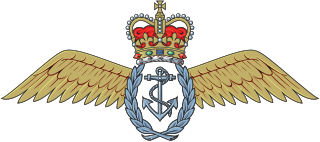
The Fleet Air Arm (FAA) is the naval aviation component of the United Kingdom's Royal Navy (RN). The FAA is one of five RN fighting arms. As of 2023 it is a predominantly "rotary" force, with helicopters undertaking roles once performed by biplanes such as the Fairey Swordfish. It operates the F-35 Lightning II for maritime strike and the AW159 Wildcat and AW101 Merlin for commando and anti-submarine warfare.
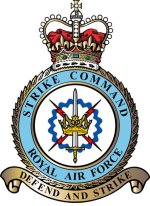
The Royal Air Force's Strike Command was the military formation which controlled the majority of the United Kingdom's bomber and fighter aircraft from 1968 until 2007 when it merged with Personnel and Training Command to form the single Air Command. It latterly consisted of two formations – No. 1 Group RAF and No. 2 Group RAF. The last Commander-in-Chief was Air Chief Marshal Sir Joe French.
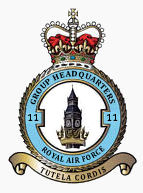
No. 11 Group is a group in the Royal Air Force first formed in 1918. It had been formed and disbanded for various periods during the 20th century before disbanding in 1996 and reforming again in 2018. Its most famous service was in 1940 in the Battle of Britain during the Second World War, when it defended London and the south-east of the United Kingdom from attacks by the German Luftwaffe. It was reformed in late 2018 as a "multi-domain operations group" to ensure the service thinks and acts in a networked way.

Marshal of the Royal Air Force Sir Peter Robin Harding, was a Royal Air Force officer who served as a bomber pilot in the 1950s, a helicopter squadron commander in the 1960s and a station commander in the 1970s. He became Chief of the Air Staff in 1988 and served in that role during the Gulf War in 1991. He became Chief of the Defence Staff in December 1992 but resigned after his affair with Lady (Bienvenida) Buck, the wife of Conservative MP Antony Buck, became public.

Marshal of the Royal Air Force Sir Andrew Henry Humphrey, was a senior officer in the Royal Air Force. He fought in the Second World War as a fighter pilot taking part in the Battle of Britain and also took part in the withdrawal from Aden in November 1967. He served as the Chief of the Air Staff advising the new Labour Government on the implementation of their latest Defence Review. He then served as Chief of the Defence Staff but caught pneumonia within three months of taking office and died shortly afterwards.

The Joint Helicopter Command (JHC) is a tri-service organisation uniting battlefield military helicopters of the British Armed Forces for command and coordination purposes.

Air Chief Marshal Sir Glenn Lester Torpy, is a retired senior Royal Air Force (RAF) commander. He was a fast jet pilot in the late 1970s and 1980s, saw active service during the Gulf War and then went on to higher command. He was the air component commander on Operation Telic and served as Chief of the Air Staff, the professional head of the RAF, from 2006 to 2009. In that role Torpy hosted the RAF's biggest air display in two decades, and argued for consolidation of all British air power in the hands of the RAF.
Air Chief Marshal Sir Peter Ted Squire, was a senior Royal Air Force officer. He was a fast jet pilot in the 1970s, a squadron commander during the Falklands War, and a senior air commander in the 1990s. Squire served as Chief of the Air Staff from 2000 to 2003. In retirement he was the chairman of the board of trustees of the Imperial War Museum and vice-chairman of the board of the Commonwealth War Graves Commission.

Air Chief Marshal Sir James Milne Robb, was a senior Royal Air Force commander. After early service in the First World War with the Northumberland Fusiliers, Robb joined the Royal Flying Corps and became a flying ace credited with seven aerial victories. He was granted a permanent commission in the Royal Air Force in 1919 and commanded No. 30 Squadron RAF in the Iraqi revolt against the British. In 1939, Robb travelled to Canada to help establish the Empire Air Training Scheme, a massive training program that provided the Royal Air Force with trained aircrew from Canada, Australia, New Zealand and Southern Rhodesia. He commanded No. 2 Group RAF of RAF Bomber Command and No. 15 Group RAF of RAF Coastal Command.
Air Marshal David Walker, was a senior Royal Air Force officer. He was the Deputy Commander, Allied Joint Force Command at Brunssum in the Netherlands from 2011 to 2013, having previously served for over three years as Deputy Commander, Allied Air Component Command at Ramstein in Germany. Prior to that appointment he was Air Officer Commanding No. 1 Group in the United Kingdom.

Air Marshal Sir Alister Murray Murdoch, was a senior commander in the Royal Australian Air Force (RAAF). He served as Chief of the Air Staff (CAS) from 1965 to 1969. Joining the Air Force in 1930, Murdoch trained as a seaplane pilot and participated in an Antarctic rescue mission for lost explorers in 1935. During World War II, he commanded No. 221 Squadron RAF in Europe and the Middle East, and later occupied senior positions on the staff of RAAF formations in the South West Pacific. His post-war appointments included Commandant of RAAF College from 1952 to 1953, Air Officer Commanding (AOC) Training Command from 1953 to 1955, Deputy Chief of the Air Staff from 1958 to 1959, and AOC Operational Command from 1962 to 1965.

Air Marshal Sir Stuart David Atha,, is a former senior officer of the Royal Air Force. He led No. 3 (Fighter) Squadron from 2000 to 2004, which included deployment to Iraq on Operation Telic, commanded RAF Coningsby (2006–08), No. 83 Expeditionary Air Group (2009–10) and No. 1 Group (2011–14), and served as the Air Component Commander for security during the 2012 London Olympics. Atha was RAF Deputy Commander Operations from 2016 to 2019.
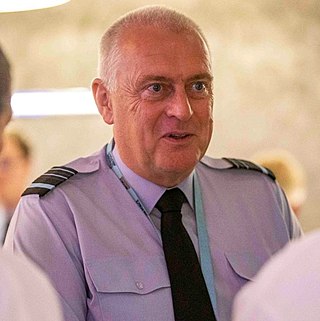
Air Marshal Sir Barry Mark North, is a retired senior Royal Air Force officer, who served as Deputy Commander (Personnel) at RAF Air Command. A helicopter pilot, North has held command appointments at all levels, notably No. 78 Squadron in the Falkland Islands, the Special Forces Flight as a squadron leader and the newly established No. 83 Expeditionary Air Group in the Middle East as an air commodore.

Air Chief Marshal Sir Andrew Douglas Pulford, is a retired senior Royal Air Force (RAF) commander. A helicopter pilot with operational service in Northern Ireland, the Falklands War and Iraq War, Pulford commanded RAF Odiham and No. 2 Group, and served as Assistant Chief of Defence Staff Operations, before taking up the post of Deputy Commander-in-Chief Personnel at Air Command and Air Member for Personnel in 2010. He became Chief of the Air Staff on 31 July 2013, retiring from the Royal Air Force on 12 July 2016.
Air Chief Marshal Sir Joseph Alfred Gilbert, is a former Royal Air Force officer who served as Deputy Commander of Strike Command from 1984 to 1986.

Air Vice-Marshal Carl William Dixon, is a retired senior commander of the Royal Air Force who served as Commander of Joint Helicopter Command from 2011 to 2014.
Air Vice-Marshal Paul Douglas Luker, is a former Royal Air Force officer who served as Commander of Joint Helicopter Command from 2002 to 2005.
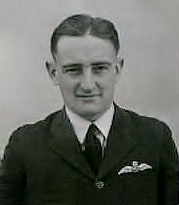
Air Vice Marshal Frank Headlam, was a senior commander in the Royal Australian Air Force (RAAF). Born and educated in Tasmania, he joined the RAAF as an air cadet in January 1934. He specialised in flying instruction and navigation before the outbreak of World War II. In April 1941, he became commanding officer of No. 2 Squadron, which operated Lockheed Hudsons. The squadron was deployed to Dutch Timor in December, and saw action against Japanese forces in the South West Pacific. After returning to Australia in February 1942, Headlam held staff appointments and training commands, finishing the war a group captain.

Air Vice-Marshal Christopher James Luck is a British charity executive and retired Royal Air Force officer. He was Commandant of the Royal Air Force College Cranwell from 2013 to 2016, and Commandant of the Joint Services Command and Staff College from 2017 to 2019. Since 2019, he has been CEO of the Shaw Trust.

Air Vice-Marshal Philip Jeremy Robinson, is a decorated British pilot and senior Royal Air Force officer.
References
- ↑ "No. 44699". The London Gazette (Supplement). 18 October 1968. p. 11328.
- ↑ RAF Historical Society Journal 25 [ permanent dead link ]
- ↑ "Biography: Air Vice-Marshal David Niven". Archived from the original on 28 February 2013. Retrieved 23 February 2013.
- ↑ "RAF Appointments List 6/11".